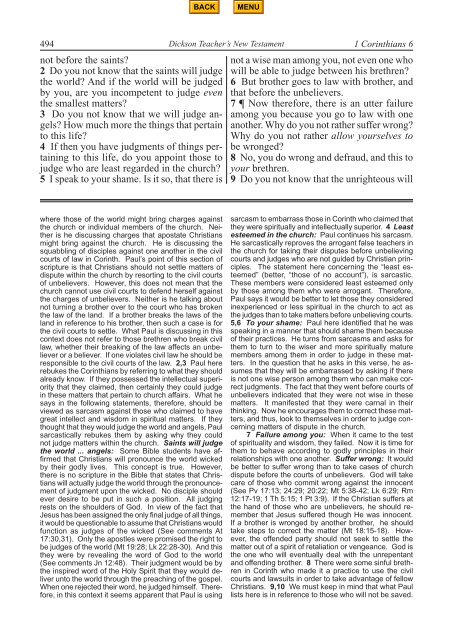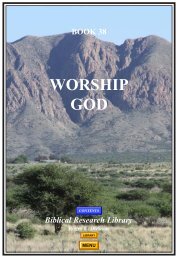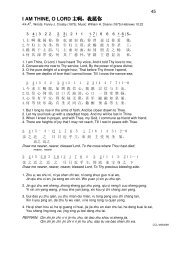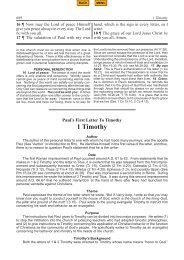1 Corinthians
1 Corinthians
1 Corinthians
You also want an ePaper? Increase the reach of your titles
YUMPU automatically turns print PDFs into web optimized ePapers that Google loves.
494 Dickson Teacher’s New Testament<br />
not before the saints<br />
2 Do you not know that the saints will judge<br />
the world And if the world will be judged<br />
by you, are you incompetent to judge even<br />
the smallest matters<br />
3 Do you not know that we will judge angels<br />
How much more the things that pertain<br />
to this life<br />
4 If then you have judgments of things pertaining<br />
to this life, do you appoint those to<br />
judge who are least regarded in the church<br />
5 I speak to your shame. Is it so, that there is<br />
1 <strong>Corinthians</strong> 6<br />
not a wise man among you, not even one who<br />
will be able to judge between his brethren<br />
6 But brother goes to law with brother, and<br />
that before the unbelievers.<br />
7 Now therefore, there is an utter failure<br />
among you because you go to law with one<br />
another. Why do you not rather suffer wrong<br />
Why do you not rather allow yourselves to<br />
be wronged<br />
8 No, you do wrong and defraud, and this to<br />
your brethren.<br />
9 Do you not know that the unrighteous will<br />
where those of the world might bring charges against<br />
the church or individual members of the church. Neither<br />
is he discussing charges that apostate Christians<br />
might bring against the church. He is discussing the<br />
squabbling of disciples against one another in the civil<br />
courts of law in Corinth. Paul’s point of this section of<br />
scripture is that Christians should not settle matters of<br />
dispute within the church by resorting to the civil courts<br />
of unbelievers. However, this does not mean that the<br />
church cannot use civil courts to defend herself against<br />
the charges of unbelievers. Neither is he talking about<br />
not turning a brother over to the court who has broken<br />
the law of the land. If a brother breaks the laws of the<br />
land in reference to his brother, then such a case is for<br />
the civil courts to settle. What Paul is discussing in this<br />
context does not refer to those brethren who break civil<br />
law, whether their breaking of the law affects an unbeliever<br />
or a believer. If one violates civil law he should be<br />
responsible to the civil courts of the law. 2,3 Paul here<br />
rebukes the <strong>Corinthians</strong> by referring to what they should<br />
already know. If they possessed the intellectual superiority<br />
that they claimed, then certainly they could judge<br />
in these matters that pertain to church affairs. What he<br />
says in the following statements, therefore, should be<br />
viewed as sarcasm against those who claimed to have<br />
great intellect and wisdom in spiritual matters. If they<br />
thought that they would judge the world and angels, Paul<br />
sarcastically rebukes them by asking why they could<br />
not judge matters within the church. Saints will judge<br />
the world ... angels: Some Bible students have affirmed<br />
that Christians will pronounce the world wicked<br />
by their godly lives. This concept is true. However,<br />
there is no scripture in the Bible that states that Christians<br />
will actually judge the world through the pronouncement<br />
of judgment upon the wicked. No disciple should<br />
ever desire to be put in such a position. All judging<br />
rests on the shoulders of God. In view of the fact that<br />
Jesus has been assigned the only final judge of all things,<br />
it would be questionable to assume that Christians would<br />
function as judges of the wicked (See comments At<br />
17:30,31). Only the apostles were promised the right to<br />
be judges of the world (Mt 19:28; Lk 22:28-30). And this<br />
they were by revealing the word of God to the world<br />
(See comments Jn 12:48). Their judgment would be by<br />
the inspired word of the Holy Spirit that they would deliver<br />
unto the world through the preaching of the gospel.<br />
When one rejected their word, he judged himself. Therefore,<br />
in this context it seems apparent that Paul is using<br />
sarcasm to embarrass those in Corinth who claimed that<br />
they were spiritually and intellectually superior. 4 Least<br />
esteemed in the church: Paul continues his sarcasm.<br />
He sarcastically reproves the arrogant false teachers in<br />
the church for taking their disputes before unbelieving<br />
courts and judges who are not guided by Christian principles.<br />
The statement here concerning the “least esteemed”<br />
(better, “those of no account”), is sarcastic.<br />
These members were considered least esteemed only<br />
by those among them who were arrogant. Therefore,<br />
Paul says it would be better to let those they considered<br />
inexperienced or less spiritual in the church to act as<br />
the judges than to take matters before unbelieving courts.<br />
5,6 To your shame: Paul here identified that he was<br />
speaking in a manner that should shame them because<br />
of their practices. He turns from sarcasms and asks for<br />
them to turn to the wiser and more spiritually mature<br />
members among them in order to judge in these matters.<br />
In the question that he asks in this verse, he assumes<br />
that they will be embarrassed by asking if there<br />
is not one wise person among them who can make correct<br />
judgments. The fact that they went before courts of<br />
unbelievers indicated that they were not wise in these<br />
matters. It manifested that they were carnal in their<br />
thinking. Now he encourages them to correct these matters,<br />
and thus, look to themselves in order to judge concerning<br />
matters of dispute in the church.<br />
7 Failure among you: When it came to the test<br />
of spirituality and wisdom, they failed. Now it is time for<br />
them to behave according to godly principles in their<br />
relationships with one another. Suffer wrong: It would<br />
be better to suffer wrong than to take cases of church<br />
dispute before the courts of unbelievers. God will take<br />
care of those who commit wrong against the innocent<br />
(See Pv 17:13; 24:29; 20:22; Mt 5:38-42; Lk 6:29; Rm<br />
12:17-19; 1 Th 5:15; 1 Pt 3:9). If the Christian suffers at<br />
the hand of those who are unbelievers, he should remember<br />
that Jesus suffered though He was innocent.<br />
If a brother is wronged by another brother, he should<br />
take steps to correct the matter (Mt 18:15-18). However,<br />
the offended party should not seek to settle the<br />
matter out of a spirit of retaliation or vengeance. God is<br />
the one who will eventually deal with the unrepentant<br />
and offending brother. 8 There were some sinful brethren<br />
in Corinth who made it a practice to use the civil<br />
courts and lawsuits in order to take advantage of fellow<br />
Christians. 9,10 We must keep in mind that what Paul<br />
lists here is in reference to those who will not be saved.









